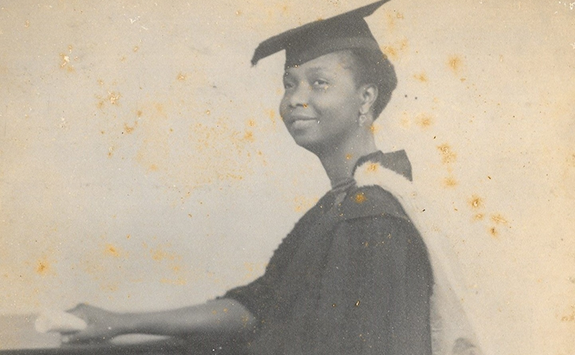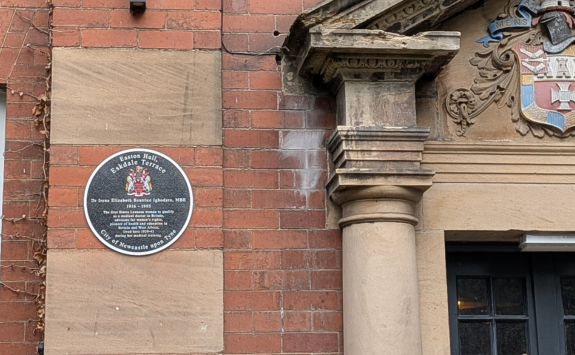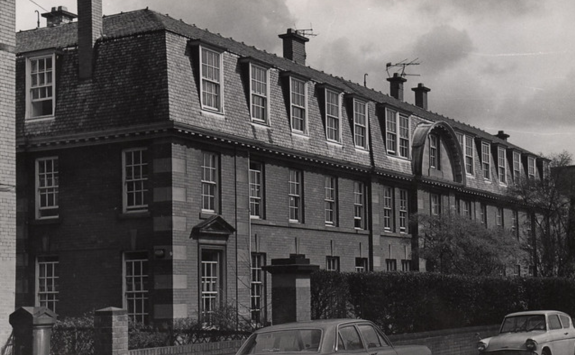Blue plaque unveiled in Jesmond in honour of Newcastle Medical School alumna and trailblazer
Dr Irene Ighodaro, who graduated from Newcastle Medical School in 1944, will be the first woman of African or Asian descent to be recognised by a plaque in Newcastle.
25 June 2025
Irene Ighodaro (née Wellesley-Cole) was one of three women in her medical school class of 60 students, and the only black woman amongst her class when she joined in 1939. Irene was part of the first cohort to be studying in the new King's College Medical School (formerly Armstrong College), and attended the opening of the new Medical School by His Majesty King George VI and Her Majesty Queen Elizabeth.
While studying, during World War II, Irene treated casualties and worked on the decontamination squad at the Royal Victoria Infirmary. Upon graduating in 1944, she worked for six months as a House Officer in the Department of Obstetrics and Gynaecology before taking over her brother’s private practice for a year in Denton, Newcastle, while he was on a work assignment with the Colonial Office in West Africa.

While living in England she co-founded the Newcastle-based Society for the Cultural Advancement of Africa and the first West African Women’s Association in England. She was also actively involved in the West African Students Union and the League of Coloured Peoples and organised an exhibition in 1943 called 'From Africa to Tyneside' at the Hatton Gallery on campus to celebrate African culture.
Irene and her husband moved to East Croydon in 1947, where she worked as a physician at the New Sussex Hospital for Women and Children. Two years later, the family moved to Nigeria, where Irene maintained a private medical practice and was a member of several Western Nigerian medical advisory committees.
Some notable achievements from Irene’s career include consulting the World Health Organization (WHO) on child and maternal health, publishing a book entitled ‘Baby’s First Year’ and setting up the University of Benin Teaching Hospital, for which she became the first chairman of the Board. This was the first time a woman had been appointed to such a high policymaking position in Nigeria, and under Irene’s leadership, the hospital was built, staffed and opened to the public in under three years. In 1958, Irene was made a Member of the Order of the British Empire (MBE).
Remembering Irene Ighodaro
Following her death in November 1995, the Dr Irene Ighodaro Memorial Foundation was established to continue Irene’s legacy of furthering the advancement of women.
Irene’s story was also featured in an exhibition at the Discovery Museum in Newcastle in 2022 called ‘Stories of Service: Tyneside’s Home Front during the Second World War’, which was co-curated by equalities activist, academic, author and community facilitator Dr Beverley Prevatt-Goldstein, in association with Imperial War Museums (IWM).
And now, Irene’s life and impact on the local community have been honoured with a plaque at Jesmond View student accommodation on Eskdale Terrace in Jesmond, known previously as Easton Hall. Easton Hall was a university-owned accommodation for female students, opened in 1915, and is where Irene lived during her medical training.
Irene is the first woman of Asian or African heritage to be recognised with a plaque in Newcastle, which was announced 30 years after her death on International Women's Day 2025. At the plaque unveiling, Irene's son Tony spoke fondly of his mother's achievements and the impact her time at Newcastle had on her life. The ceremony was also attended by the Lord Mayor of Newcastle, Councillor Henry Gallagher and Dr Beverley Prevatt Goldstein, who uncovered Irene's story for the exhibition at the Discovery Museum and campaigned for her to be recognised by Newcastle City Council.x


